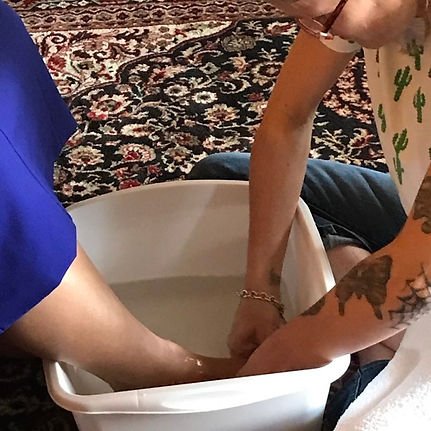

Annual Foot Washing

Our Story
On the evening before His death, Jesus washed the feet of His disciples, then instructed that His followers would continue this practice to help us remember. What are we to learn from this ? Christ gave a directive to wash one another’s feet and, when we reflect upon it, we find a vital teaching. In the scriptural examples of foot washing for guests, we find that water was often provided so that guests could wash their own feet When Joseph welcomed his brothers to a banquet, the steward provided water for them to wash their feet before supper was served (Genesis 43:24). The story of the old man from Ephraim who housed the traveling Levite and his concubine (see Judges 19:16-21) similarly records, “So he brought him into his house, and gave fodder to the donkeys. And they washed their [own] feet, and ate and drank” (Judges 19:21). But in Christ’s directive there is an “above and beyond” requirement to actively participate in the washing of another’s feet. This is something we do during Passover. Our annual Passover foot washing therefore teaches these important lessons: Jesus Christ set us an example We perform the foot washing to teach the humbleness of servanthood as Christ, as our Lord and Teacher, that this is what He wanted His disciples to practice: “If then I, the Lord and the Teacher, have washed your feet, you also ought to wash one another’s feet. For I have given you an example, that you should do as I have done to you” (John 13:14-15). He is our Teacher. Will we allow Him to instruct us? Jesus instituted this ordinance for His disciples, to illustrate His willingness to unconditionally serve and love us. He commands that we humble ourselves and follow His example. Beyond that, we should want to follow His example because we love Him and desire to be like Him. Otherwise, we risk going through the motions just because we are told to do it. Humility and service are required Peter exclaimed, “You shall never wash my feet!” (John 13:8). Christ’s answer was that if Peter didn’t submit to the ordinance, he would have no part in Christ. When we wash someone’s feet, we take on the position of the lowest of servants. To do it properly requires humility—the setting aside of all pride. Jesus Christ humbled Himself when He came down to this earth as a mortal man, but He further humbled Himself when He took on the duties of a foot-washing servant. That is what Peter was responding to when Jesus tried to wash his feet. In that respect, foot washing takes humility from both: the one who washes, and the one who is washed. Jesus Christ said, “If I do not wash you, you have no part with Me”—you can’t have a relationship with Me. With Jesus Christ’s explanation, we understand that the act helps to build a relationship with the individual whose feet we are washing. Paul illustrates the humility of Christ by showing He gave up His divinity to become a man (Philippians 2:5-8). In that humble state, He instructed His disciples to likewise “wash one another’s feet.” To be Christ’s servants we must be spiritually clean Although the primary lessons are humility, love and service, there is another lesson we can learn about being clean spiritually and being an influence on others, which helps them to be spiritually clean. When Christ told Peter that, unless Peter submitted to the foot washing, he would have no part in Christ, Peter responded, “‘Lord, not my feet only, but also my hands and my head!’ Jesus said to him, ‘He who is bathed needs only to wash his feet, but is completely clean; and you are clean’” (John 13:9-10). Christ’s words that “He who is bathed needs only to wash his feet” have led some to think of the following analogy: Christ’s followers are cleansed at baptism, and we are further cleansed each time we confess our sins and ask for forgiveness. But as we go through the daily “walk” of life, some of the worldly influences rub off on us, like dust gets on the feet of someone walking. If that is a valid analogy, then the Passover foot washing becomes an annual reminder of our continual need to be washed from the sinful influences of the world. Washing another person’s feet also reminds us that we are involved in helping others to be spiritually clean. The book of Hebrews exhorts baptized members who have been “washed with water” to consider others, exhorting them in fellowship (Hebrews 10:22-25). The book of Hebrews, in contrasting the Old Testament sacrificial system, says Christ’s sacrifice cleanses our conscience from dead works so we may serve the living God (Hebrews 9:14). The apostle John wrote that on confession of sin we receive forgiveness and cleansing from unrighteousness (1 John 1:9). In our annual self-reflection, it helps to consider the cleansing we need through Christ’s sacrifice, the cleansing that we have received, and the and the cleansing we help others to seek. Our annual foot washing ceremony helps reinforce these lessons. Be reminded that our spiritual life involves repentance, bath through Baptism in name of Jesus Christ and live a holy and acceptable life.





